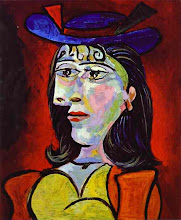
Poetry Roundup is at Writing and Ruminating this week.
This is one of the most erotic poems I know and sends a shiver down my spine every time I read it.
Duffy is one of the most famous modern British poets and was born in Glasgow, Scotland in 1955. The poem is dedicated to Judith Radstone, whose 2001 obituary described her as a "radical bibliophile devoted to the worlds of poetry and protest". The poem came from a conversation the two had about the tradition of ladies' maids wearing their misstresses pearls in order to improve their lustre.
Warming Her Pearls
for Judith Radstone
by Carol Ann Duffy
Next to my own skin, her pearls. My mistress
bids me wear them, warm then, until evening
when I'll brush her hair. At six, I place them
round her cool, white throat. All day I think of her,
resting in the Yellow Room, contemplating silk
or taffeta, which gown tonight? She fans herself
whilst I work willingly, my slow heat entering
each pearl. Slack on my neck, her rope.
She's beautiful. I dream about her
in my attic bed; picture her dancing
with tall men, puzzled by my faint, persistent scent
beneath her French perfume, her milky stones.
I dust her shoulders with a rabbit's foot,
watch the soft blush seep through her skin
like an indolent sigh. In her looking-glass
my red lips part as though I want to speak.
Full moon. Her carriage brings her home. I see
her every movement in my head...Undressing,
taking off her jewels, her slim hand reaching
for the case, slipping naked into bed, the way
she always does...And I lie here awake,
knowing the pearls are cooling even now
in the room where my mistress sleeps. All night
I feel their absence and I burn.
Duffy is one of the most famous modern British poets and was born in Glasgow, Scotland in 1955. The poem is dedicated to Judith Radstone, whose 2001 obituary described her as a "radical bibliophile devoted to the worlds of poetry and protest". The poem came from a conversation the two had about the tradition of ladies' maids wearing their misstresses pearls in order to improve their lustre.
Warming Her Pearls
for Judith Radstone
by Carol Ann Duffy
Next to my own skin, her pearls. My mistress
bids me wear them, warm then, until evening
when I'll brush her hair. At six, I place them
round her cool, white throat. All day I think of her,
resting in the Yellow Room, contemplating silk
or taffeta, which gown tonight? She fans herself
whilst I work willingly, my slow heat entering
each pearl. Slack on my neck, her rope.
She's beautiful. I dream about her
in my attic bed; picture her dancing
with tall men, puzzled by my faint, persistent scent
beneath her French perfume, her milky stones.
I dust her shoulders with a rabbit's foot,
watch the soft blush seep through her skin
like an indolent sigh. In her looking-glass
my red lips part as though I want to speak.
Full moon. Her carriage brings her home. I see
her every movement in my head...Undressing,
taking off her jewels, her slim hand reaching
for the case, slipping naked into bed, the way
she always does...And I lie here awake,
knowing the pearls are cooling even now
in the room where my mistress sleeps. All night
I feel their absence and I burn.











